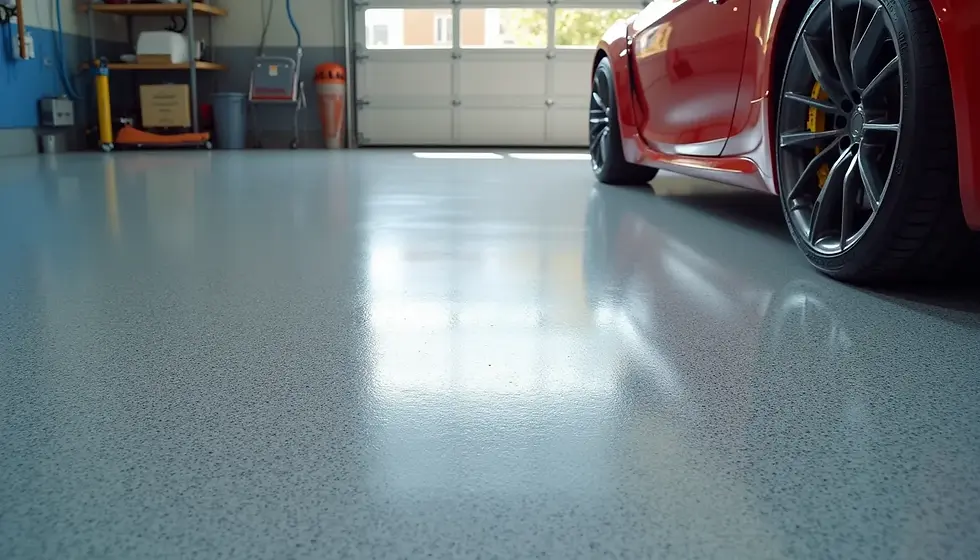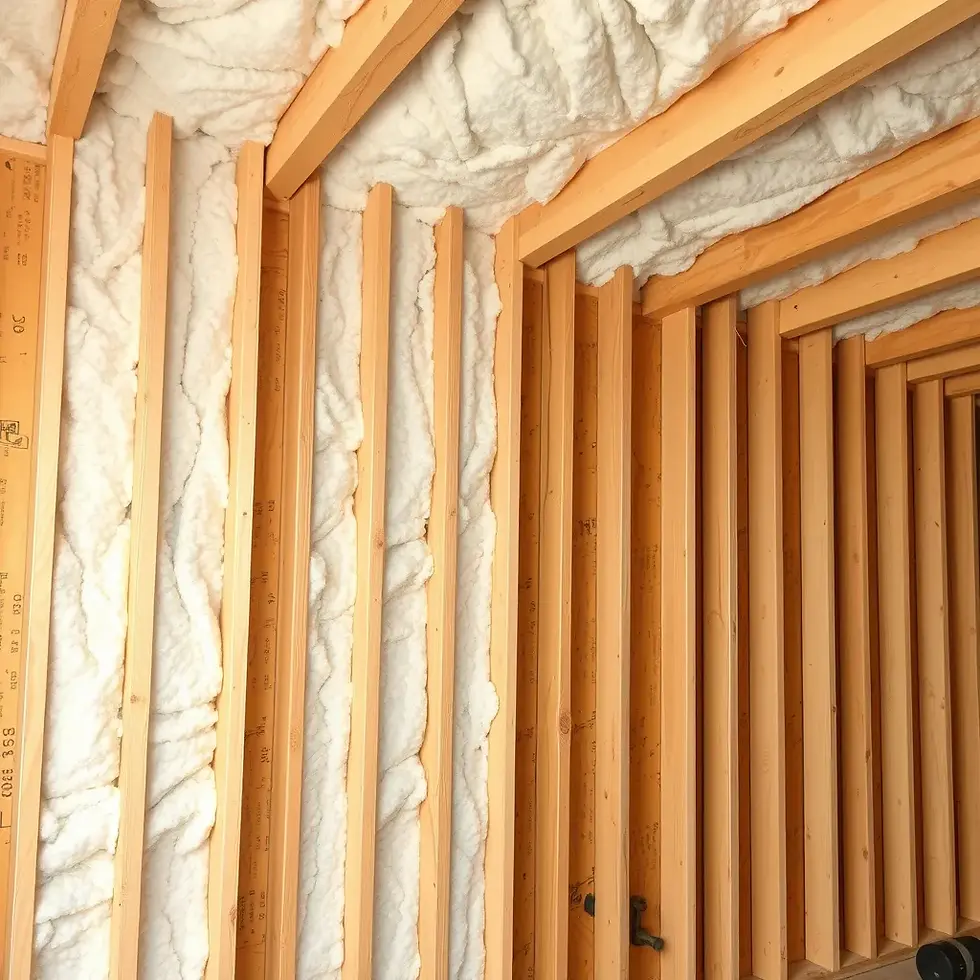Epoxy Garage Floor Cost: The Real Numbers
- Mei-Lin Arora

- Sep 3
- 5 min read
Updated: Sep 13
You’re staring at a stained slab and fantasizing about a glossy, flake-flecked surface that looks like a showroom. Great taste. But first, you want honest math on epoxy garage floor cost—what drives it, where the money goes, and when a DIY epoxy garage floor is worth the weekend. Here’s the straight talk, ready to paste into Wix and hand to your budget. 🔧

Epoxy Garage Floor Cost: The Fast Answer
Most homeowners pay about $2–$12 per square foot, with national averages around $2,500 and upper-end projects past $5,700, depending on prep and system type—see long-running cost snapshots from HomeAdvisor and Angi.
If you only remember one thing: prep is the price gatekeeper—moisture tests, crack repairs, and mechanical profiling separate a floor that lasts from a floor that peels.
If overspray hit plastic, this explainer on what paint and epoxy remover does to plastic can save a handle or bezel.
What You’re Actually Buying (and Why Prep Dominates)
Scope items that drive the cost to epoxy a garage floor:
Surface preparation
Degrease, concrete etch or grind, shot-blast where needed.
Moisture testing (tape test at minimum; calcium chloride or RH probes for problem slabs).
Crack/spall repair with epoxy paste or polyurea fillers.
Mechanical profile to a concrete surface profile (CSP) that coatings can bite into—a best practice the professional trade has pushed for years; see coating fundamentals at Concrete Network.
Coating system
Primer (often epoxy or moisture-tolerant epoxy).
Base coat (100% solids epoxy for durability).
Broadcast (decorative flakes or quartz, optional).
Topcoat (clear epoxy, polyurethane, or polyaspartic for UV/chemical resistance).
Logistics & protection
Masking, expansion joints, baseboard edges, and cure-time protection.
Ventilation and PPE to manage fumes/particulates; the EPA reminds us that coatings can emit VOCs, especially during application, so airflow and product selection matter: VOCs and indoor air quality.

Ballpark Totals by Garage Size (Typical Prep + Flake System)
One-car (≈240 sq ft): ~$800–$2,500
Two-car (≈400–480 sq ft): ~$1,600–$5,700
Three-car (≈650–750 sq ft): ~$2,600–$9,000
These ranges line up with national aggregates from HomeAdvisor and Angi and assume healthy concrete plus mechanical prep.
Cost to Epoxy Garage Floor: What Pushes You Up or Down
Concrete condition: oil-soaked, cracked, or spalling slabs need extra repair.
Moisture: if vapor drive is high, you may need a moisture-tolerant primer (adds cost but saves the project).
System thickness: metallic epoxies, quartz broadcast, or heavy-build systems add material and time.
UV exposure: near big windows? You’ll want a UV-resistant topcoat (polyurethane or polyaspartic).
Access and masking: cluttered garages and lots of verticals mean more labor.
Region & labor rates: urban shops, premium brands, and weekend timing can all raise bids.
If you’re planning a garage makeover, this one-stop DIY epoxy flake garage floor guide shows prep that actually lasts.

DIY Epoxy Garage Floor: Realistic Budget and Risks
DIY materials for a single-car garage typically run $150–$500 for big-box kits; a two-car project with better-grade materials is often $300–$900 (rollers, squeegees, crack filler, acid/etch or rental grinder, flakes, and a topcoat). DIY can be a great value on clean, low-moisture slabs.
What DIYers get wrong:
Skipping degreasing and mechanical profile (“it looked clean”).
Coating over damp concrete.
Underestimating working time for 100% solids epoxy (it’s not wall paint).
Forgetting ventilation and PPE; even when epoxies are low-odor, application can raise VOC/particulate exposure (see the EPA note above and follow product SDS).
Pro tip: If your slab fails the moisture checks or has chronic oil staining, price a pro—fixing a failed coating is pricier than doing it right once. For benefits, systems, and durability basics, the long-standing Concrete Network garage floor hub is a solid reference.
Epoxy Garage Floor Cost vs. Other Options
One-part “garage paint”: cheapest up front, but least durable; expect re-coat cycles.
2-part epoxy kit (waterborne): decent DIY starter, thinner film; prep is still king.
100% solids epoxy + polyaspartic topcoat (pro): highest initial cost, best life and chemical resistance.
Interlocking tiles or PVC rolls: fast install, hides sins, but can trap moisture and telegraph slab issues.
Short version: epoxy for a garage floor wins on long-term durability per dollar—if you respect prep and pick the right system for your slab’s moisture and UV exposure.
Step-By-Step: The Professional Workflow (So You Can Grade Bids)
Moisture & condition checks
Tape test, calcium chloride or RH probes if needed; map cracks and oil spots.
Degrease + mechanical prep
Grind or shot-blast to the target profile; vacuum thoroughly.
Repair
Fill cracks/spalls; re-grind flush.
Prime
Moisture-tolerant epoxy primer where warranted.
Base coat
100% solids epoxy, properly mixed and applied by squeegee/roller.
Broadcast (optional)
Decorative flakes or quartz to rejection; scrape and vacuum.
Topcoat
Clear epoxy, polyurethane, or polyaspartic for abrasion/UV resistance.
Cure & return to service
Foot traffic typically 12–24 hours; light vehicle traffic 2–3 days; full cure up to 7 days (product-dependent).
Line-Item Bid Checklist (Compare Apples to Apples)
Prep method and square footage (grind vs. acid etch).
Moisture testing and vapor-tolerant primer, if required.
Resin chemistry and solids content (100% solids vs. waterborne).
Number of coats and mil thickness for each.
Flake size/coverage and topcoat type (polyaspartic or polyurethane).
Warranty terms and cure/return-to-service schedule.
Evidence of proper ventilation/PPE during install; OSHA’s general respiratory guidance applies to coating operations—pros should have a plan: OSHA respiratory protection basics.

What a “Good” Finish Looks Like (So You Don’t Settle)
Even gloss with no roller lines or low spots.
No fisheyes (usually from silicone/oil contamination).
Clean edges at baseboards and expansion joints.
Flake broadcast fully covered and scraped smooth before topcoat.
No ambering near sun-washed doors if UV-resistant topcoat used.
FAQs
How much does epoxy garage floor cost (one sentence)?
Expect $2–$12 per square foot (often around $2,500 total), with higher prices for heavy prep, moisture mitigation, and premium topcoats.
What’s the cost to epoxy garage floor for a 2-car?
Roughly $1,600–$5,700 depending on prep, moisture primer, and system thickness—use the low end for clean, dry slabs and the high end for full pro systems.
Is DIY epoxy garage floor worth it?
Yes on clean, low-moisture slabs if you can grind/etch, repair cracks, and follow cure windows; it’s not worth it if the slab is oily or damp.
How long will an epoxy floor last?
A quality system with a UV-resistant topcoat typically lasts 5–10+ years in residential garages; maintenance (gentle cleaners, floor mats under kickstands) extends life.
Epoxy vs. polyaspartic—what’s better?
Epoxy builds thickness and bonds incredibly well; polyaspartic excels as a fast-curing, UV-resistant topcoat. Many of the best systems use both.
Can epoxy go over damp concrete?
Not directly—verify moisture and use a moisture-tolerant primer if tests flag issues; otherwise expect blistering/peeling.
Conclusion: The Smart Way to Budget Garage Floor Epoxy Cost 🎯
When friends ask “how much does epoxy garage floor cost?” give them the real talk: $2–$12 per square foot, and prep decides whether it lives or lifts. Decide early between DIY epoxy garage floor and pro install, insist on moisture testing, choose a system (epoxy for build, polyaspartic for UV), and compare bids line-item by line-item.
Do that, and your garage goes from stained slab to durable, easy-clean showpiece—without budgeting surprises. 😅



Comments